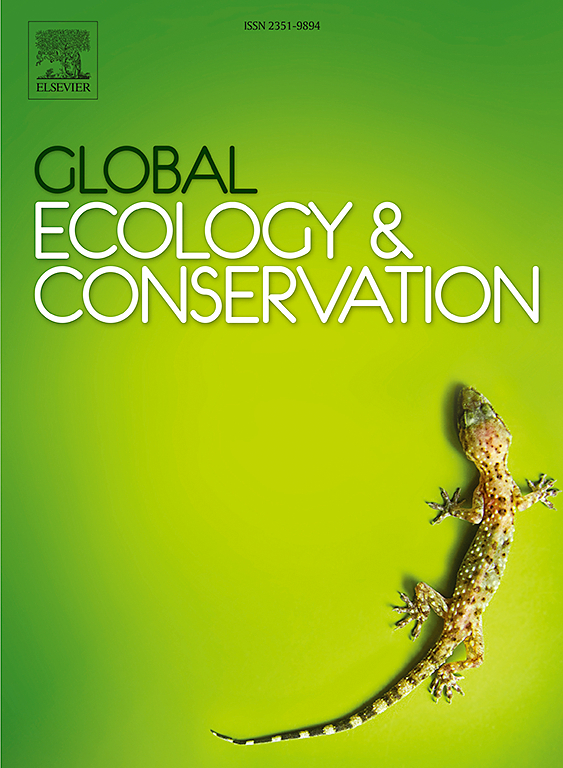Impact of pine wilt disease infection on multiple ecosystem services and their trade-offs in subtropical Masson pine forests
IF 3.5
2区 环境科学与生态学
Q1 BIODIVERSITY CONSERVATION
引用次数: 0
Abstract
Pine wilt disease (PWD) severely damages the health, stability, and functions of pine forests. However, empirical evidence regarding the impact of PWD on multiple ecosystem services in these forest ecosystems remains limited. This study investigated five ecosystem services, namely carbon sequestration, water conservation, soil nutrient accumulation, biomass nutrient accumulation and understory plant diversity in subtropical Masson pine (Pinus massoniana) forests, and quantified their trade-offs along varying ages of PWD infection (uninfected (0 years), 6, 10, and 16 years). The results showed that PWD infection significantly affected ecosystem services in Masson pine forests, with decreased carbon sequestration, water conservation, and biomass nutrient accumulation in 6 years of PWD infection forests. As the duration of PWD infection increased, the composite score of ecosystem services initially decreased, then increased, and finally decreased again. In contrast, soil conservation and understory plant diversity showed an initial increase, followed by a decline. Moreover, PWD infection increased the trade-offs among ecosystem services, with the highest trade-offs for 10 years of infected forests. PWD infection altered the trade-offs between understory plant diversity and other ecosystem services from low to high levels. Our results suggest that forest management should be strengthened to accelerate the recovery of ecosystem services while controlling PWD infection in these disturbed forests.
亚热带马松森林中松树枯萎病感染对多种生态系统服务及其权衡的影响
松树枯萎病(PWD)严重损害松树林的健康、稳定性和功能。然而,有关 PWD 对这些森林生态系统中多种生态系统服务影响的实证证据仍然有限。本研究调查了亚热带马松(Pinus massoniana)林的碳封存、水源涵养、土壤养分积累、生物量养分积累和林下植物多样性这五种生态系统服务,并量化了它们在不同感染病虫害年龄段(未感染(0 年)、6 年、10 年和 16 年)的权衡。结果表明,PWD 感染严重影响了马松森林的生态系统服务,PWD 感染 6 年的森林碳固存、水源保护和生物量养分积累均有所下降。随着PWD感染持续时间的延长,生态系统服务的综合得分先是下降,然后上升,最后再次下降。与此相反,土壤保持和林下植物多样性则呈现出先上升后下降的趋势。此外,感染 PWD 增加了生态系统服务之间的权衡,受感染森林 10 年的权衡最高。PWD感染改变了林下植物多样性和其他生态系统服务之间的权衡,从低水平变为高水平。我们的研究结果表明,在这些受干扰的森林中,应加强森林管理以加快生态系统服务的恢复,同时控制PWD感染。
本文章由计算机程序翻译,如有差异,请以英文原文为准。
求助全文
约1分钟内获得全文
求助全文
来源期刊

Global Ecology and Conservation
Agricultural and Biological Sciences-Ecology, Evolution, Behavior and Systematics
CiteScore
8.10
自引率
5.00%
发文量
346
审稿时长
83 days
期刊介绍:
Global Ecology and Conservation is a peer-reviewed, open-access journal covering all sub-disciplines of ecological and conservation science: from theory to practice, from molecules to ecosystems, from regional to global. The fields covered include: organismal, population, community, and ecosystem ecology; physiological, evolutionary, and behavioral ecology; and conservation science.
 求助内容:
求助内容: 应助结果提醒方式:
应助结果提醒方式:


